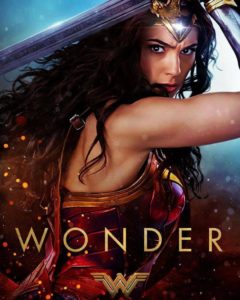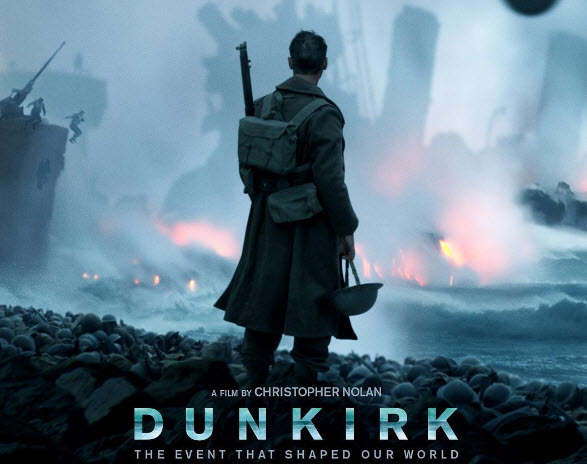 I like nearly all of the superhero movies that have inundated the summer cinema for the last decade, but Wonder Woman might be my favourite. For one thing, it is set in Europe during the First World War. I’ve been interested in The Great War since a veteran came to my grade 7 classroom and talked about his experiences in the trenches. My interest continues; since 2014, I’ve read at least 20 books on the First World War–it’s been my way of engaging the centennial.
I like nearly all of the superhero movies that have inundated the summer cinema for the last decade, but Wonder Woman might be my favourite. For one thing, it is set in Europe during the First World War. I’ve been interested in The Great War since a veteran came to my grade 7 classroom and talked about his experiences in the trenches. My interest continues; since 2014, I’ve read at least 20 books on the First World War–it’s been my way of engaging the centennial.
I also like good writing. When I watch a movie, I don’t focus on the writing and decide if it is good or not. If it’s good I don’t wince or snort during dialogue. I winced only once in this movie; more on this later.
The big story is also part of writing and I love this big story because of how it presents the Gospel to a modern audience.
SPOILER ALERT
I’m obviously not much of a comic book fan, because I didn’t know that Wonder Woman is Diana, the daughter of Zeus.
Importantly, in the world of the movie, all the gods (except Diana and her brother, Ares) are dead. By the end of the story, we are down to just one diety. This parallels the Modern story where all the gods are killed off one by one; the death of the last one, the Christian God, was declared by Nietzsche’s madman in The Gay Science (1882). This was thought to be good news for humanity, for without the gods we are free.
On a popular level, there was quite a bit of optimism in the late 19th century–we didn’t need God. Human ingenuity seemed limitless; science and technology, the offspring of our new god-–Reason, would lead us to a better world. This optimism was also based on human perfectibility–the idea that human beings are basically good and getting better. This march toward a better world and human perfection fit nicely with a popular misinterpretation of Darwin’s On the Origin of Species–rather than simply adapt, organisms improve. Although many thinkers and artists questioned 19th century optimism, society in general looked forward to the new century with positive anticipation. Then came WWI.
Faith in human goodness continues despite a calamitous 20th century. I recently had a conversation with a friend about basic human nature. He said he believed that people are basically good. Almost all our problems come from a small minority who are bad. The solution? These bad apples need to be rounded up and put into prison. A lot of my other friends identify social conditions (poverty, racism, lack of educational opportunities, etc.) as the source of our problems, but their faith in human goodness is unfaltering. They believe that everyone’s natural goodness will shine through with the elimination of poverty, racism and equal access to education.
The battle continues in our culture–more prisons or more social programs, but neither of these solutions will work, because both have a naïve understanding of the problem. The problem is not a few “bad apples” nor is it poverty or racism. It’s us!
[click_to_tweet tweet=”The battle continues in our culture–more prisons or more social programs, but neither of these solutions will work, because both have a naïve understanding of the problem. The problem is not a few ‘bad apples’ nor is it poverty or racism. It’s us!” quote=”The battle continues in our culture–more prisons or more social programs, but neither of these solutions will work, because both have a naïve understanding of the problem. The problem is not a few ‘bad apples’ nor is it poverty or racism. It’s us!”]
Educating Wonder Woman
When Diana leaves the Edenic paradise for Europe she is naïve. She thinks that the problem is an evil Ares–the black sheep of the Greek pantheon. Ares is wiser than Diana; he understands the problem, and it’s not him, and it’s not war. Human beings are what’s wrong with the world. They aren’t made to be evil, by some external force, they choose it. Evil lives within their hearts–all of them are corrupt. Steve Trevor says, “Maybe we are all to blame.” We are: Paul says in Romans that “all have sinned and fall short of the glory of God.” For Ares, doesn’t represent Evil, he represents Justice. It is just that human beings are destroyed; we deserve destruction.
That we all deserve destruction is a central theme in the film. It counters both Conservative and Liberal anthropologies. At one point our group of heroes offers up the familiar Irish drinking toast:
May we get what we want…and may we get what we need. But may we never get what we deserve.
As a human race, we don’t deserve Wonder Woman; we deserve destruction. This idea is everywhere in the film, and it’s central to the Gospel. Diana sets out to be the saviour of humanity, and both her mother, Hippolyta, and Ares tell her that humanity doesn’t deserve her. Her initial motivation to save us is her naïve assumption that we are good and deserved to be saved. Diana experiences a major crisis when der declared purpose to save humanity from evil, comes into conflict with her realization that Ares is right, the human race deserves destruction.
Undeserved Redemption
Like Jesus Christ in the real world, Steve Trevor is our advocate in the world of the movie. He says, “it’s not about what they deserve, it’s what you believe.” I winced at this line, initially considering it hokey, but there’s more to it than I first thought. I missed the pronouns they and you. He says that the motivation of the saviour comes not from the attributes of those who need saving, but from the one who saves. This echoes Paul’s words in Roman’s 5:6-8 where he says,
6 . . . when we were still powerless, Christ died for the ungodly. 7 Very rarely will anyone die for a righteous person, though for a good person someone might possibly dare to die. 8 But God demonstrates his own love for us in this: While we were still sinners, Christ died for us.
Steve Trevor exemplifies the quality necessary for heroes to possess. When he gets into the big bad airplane with all that deadly gas he knows it’s a one-way trip. He willingly dies in order to save all the residents of the city of London from Doctor Poison’s gas attack.
The lesson is not lost on Dianna. Trevor’s death resolves her crisis, and in that resolution, we get our cinematic saviour. She summarizes her journey from naïve warrior to wise saviour:
I glimpsed the darkness that lives within their light. I learned that inside every one of them, there will always be both. The choice each must make for themselves – something no hero will ever defeat. I’ve touched the darkness that lives in between the light. Seen the worst of this world, and the best. Seen the terrible things men do to each other in the name of hatred, and the lengths they’ll go to for love. Now I know. Only love can save this world.
To an audience that has been exposed to the Hollywood gospel for their entire life, this line comes as no surprise–“true [romantic] love” is always the source of salvation. This is not just the case for romantic comedies, it’s true of almost every film of almost any genre. But this is not what is happening in this story.
She’s not talking about Romantic love, but love of another kind–the love that is manifest in self-sacrifice.
The Gospel
Over and over in the Bible we find that God will save us, because he wants to save us. Not because we deserve it, but because it is his will to do it. Search up “Bible verses, condemnation” and you will find a long list of verses about how we deserve destruction, but the idea of condemnation rarely stands alone. It is almost always accompanied by God’s desire to save us. Romans 5:8 puts it succinctly:
But God demonstrates his own love for us in this: While we were still sinners, Christ died for us.
This is what Wonder Woman comes to understand as she resolved to continue as a saviour for mankind.
One final element of the Gospel is present in the movie–the role of ordinary people in the story of redemption–just before Steve Trevor gets onto the airplane where he will die, he tells Diana, “I can save today. You can save the world.” We cannot save ourselves, and we can’t save the world, but we can, in small ways, imitate our Saviour as we show self-sacrificial love to others, whether they deserve it or not. It’s not going to save the world, that’s already been taken care of, but it could save today.
Not unrelated is my post on the Warsaw Ghetto.


 I like nearly all of the superhero movies that have inundated the summer cinema for the last decade, but Wonder Woman might be my favourite. For one thing, it is set in Europe during the First World War. I’ve been interested in The Great War since a veteran came to my grade 7 classroom and talked about his experiences in the trenches. My interest continues; since 2014, I’ve read at least 20 books on the First World War–it’s been my way of engaging the centennial.
I like nearly all of the superhero movies that have inundated the summer cinema for the last decade, but Wonder Woman might be my favourite. For one thing, it is set in Europe during the First World War. I’ve been interested in The Great War since a veteran came to my grade 7 classroom and talked about his experiences in the trenches. My interest continues; since 2014, I’ve read at least 20 books on the First World War–it’s been my way of engaging the centennial.